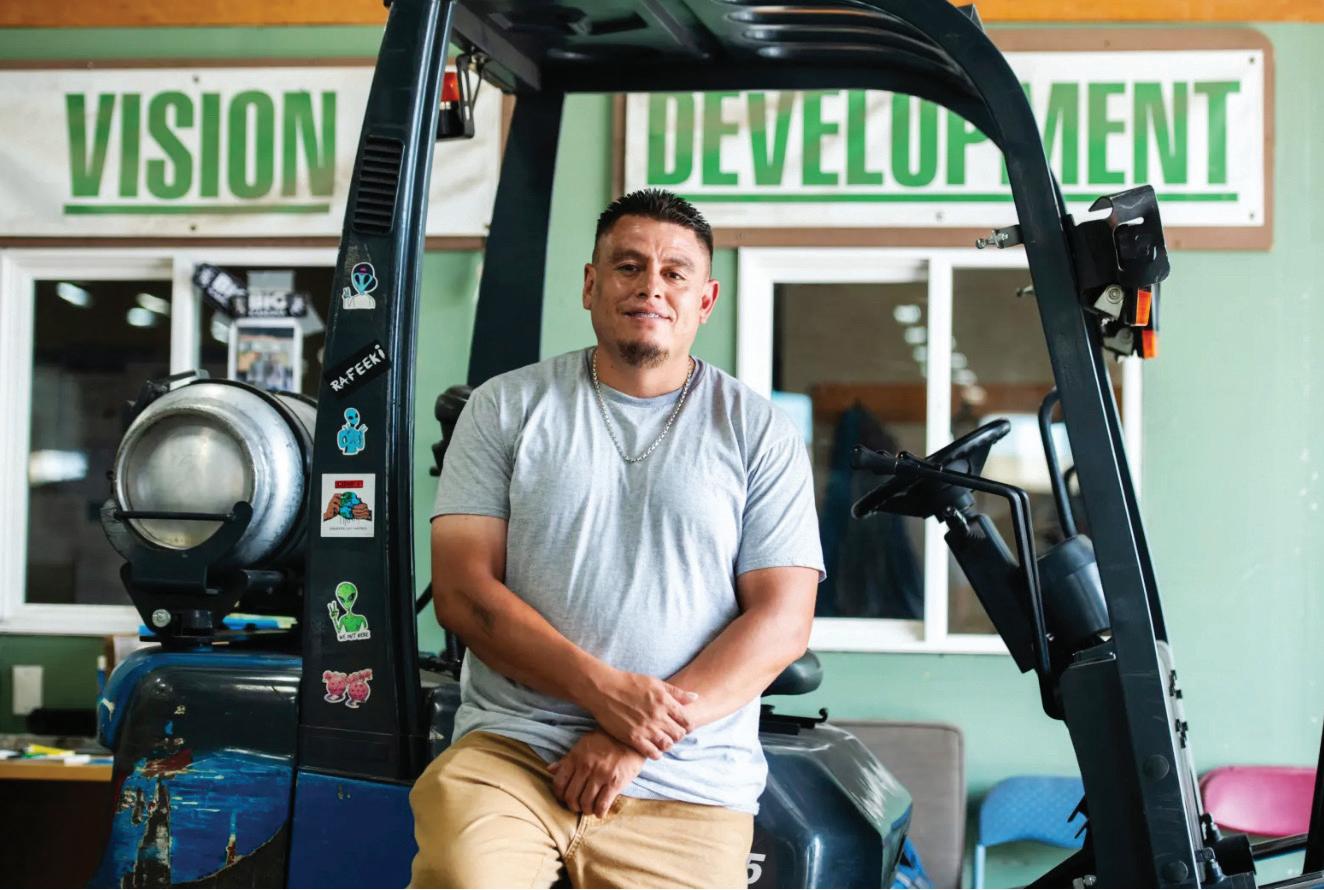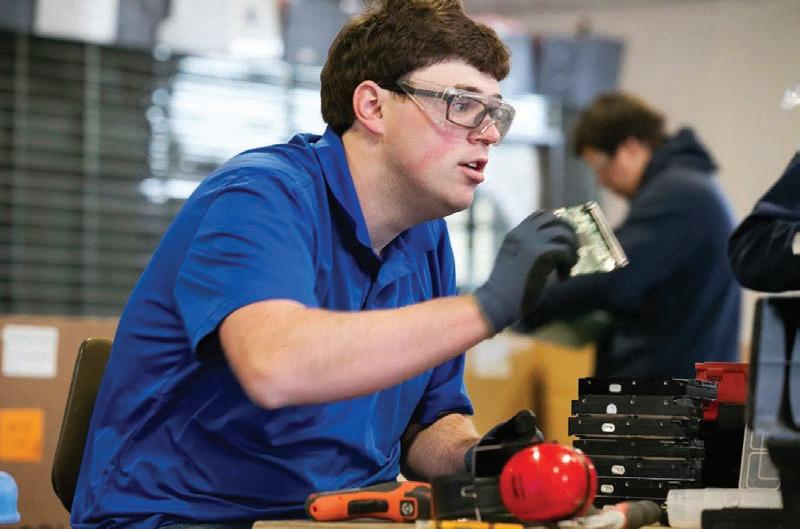
6 minute read
Donating gently used household goods
suggested Spring Back for recycling mattresses at a lower price.
BY TAMARA CHUANG THE COLORADO SUN
Until about two-and-a-half years ago, Bobby Dainko was living in his car, addicted to meth.
Today, he’s clean and works full time at Spring Back Colorado Mattress Recycling, a nonpro t in Commerce City that recycles used mattresses that would otherwise end up in land lls. e nonpro t deliberately employs folks like Dainko — graduates of a nearby addiction treatment program.
“Yeah, I was living in my car right down the street here,” said Dainko, pointing out the window from an air-conditioned o ce where he answers calls and schedules mattress pickups. “I just got sick and tired of what it takes to live homeless. I used to think, ‘Oh, you’re homeless. You don’t have to do anything.’ But no, it’s a daily battle. Hour by hour even. Where am I going? What am I doing? I did that for almost a year and got so sick of it. I called Wellness Court and they welcomed me back at 2 in the morning.”
Dainko had previously worked at Spring Back after graduating from the nearby Stout Street Foundation substance abuse recovery program in 2017. But he relapsed a year later, after his mother passed away. He just wasn’t done with drugs, he says now. But he believes he’s nally kicked his addiction for good. And Spring Back gave him his job back.
“ e owner (Christopher Conway), he said, ‘Bobby, you’ve never lied to me, you’ve never stolen from me. ose are the two things I don’t tolerate. Yes, I’ll give you another chance.’ And he did,” said Dainko, who now has bene ts like health insurance.
“And because of that, I got a second chance here.”
Uno cial and o cial workforce programs have been a source of labor for Colorado employers long before the pandemic and the ensuing labor shortage struck. But there’s another breed of workforce programs that help the planet, help consumers get rid of old stu and help people who have di culty nding work get a job. From diverting old computers and unwanted couches from land lls to refurbishing or upcycling materials for another life, the social enterprises often hover below the public radar. But some have caught the attention of the Colorado Department of Public Health & Environment, which awarded grants to many programs aimed at diverting waste from the land lls.
“We applaud companies working on recycling solutions, particularly when they accomplish that by developing socially responsible business models that help some of Colorado’s disadvantaged workers learn new skills,” Kendra Appelman-Eastvedt, the recycling grants program manager, wrote in an email.

Here’s a few of them, but please share others in your local community and we’ll compile a list for a future story.
Spring Back gets a shoutout from the city of Denver’s bulky-item disposal page. e company also partners with ve land lls around the state by providing a trailer to collect mattresses for recycling at $30 each. Otherwise land ll customers often pay more to dispose of a mattress — it costs $74 at the Waste Management-operated Denver Arapahoe Disposal Site in Aurora. And yes, the mattress goes into the land ll, said a Waste Management employee who answered a pricing call. She
Spring Back works with mattress stores to collect unwanted mattresses, and it has partnerships with a handful of land lls, including in Mesa and Larimer Counties, and several cities, including Pueblo, Loveland and Denver. In the Denver area, there’s mattress pick up. On an average week, Spring Back workers tear down between 1,500 to 2,000 unwanted mattresses; strip them for steel, foam, wood and other recyclable parts; and send very little to the land ll.
“ e environmental impact is huge. Long-term sustainability is really important. Working with cities and municipalities is great. But this whole thing was started out of the desire to help folks and really help them get their life turned around,” said Peter Conway, vice president of business development and the founder’s son. “ at’s the rewarding part, for me at least.”
Eric Gallegos, who completed the Stout Street program and graduates in February, plans to stay at Spring Back “for the long haul.”

Gallegos, who had the choice of prison or Stout Street, said that Stout Street showed him the path out of a life of drugs. Spring Back helps him stay on it.
“I’m comfortable here. I like to have a good, productive work day that challenges me. And this is labor intensive,” said Gallegos, who is from Trinidad. “When you make it through the day, you feel accomplished.”
Getting a job has long been part of Stout Street’s program, said Bradley Lucero, its executive director. e organization has worked with Spring Back for about a decade and also works with organizations like Food Bank of e Rockies and construction companies. It’s always looking for new partners willing to employ those at Stout Street, most who are there because their only other option was prison.
“ ey’re not used to getting up and going to work. ey’re not used to what minimum wage looks like, or living on $20 an hour because selling drugs, obviously they could make thousands of dollars in an afternoon,” Lucero said. “Having an idea of what a future looks like sober is huge.”
And for those who are tired of their old way of life and ready for more stability, the partnership with employers helps graduates get a second chance to reboot their work life.
“Some of them will take advantage of it, some of them will squander it,” Lucero said. “But for the most part, it’s folks that understand they have a criminal history and the longer they can keep a solid resume or build a solid resume, they understand that’ll help their odds down the road to apply and hopefully retain other positions.”
Seeking developmentally disabled workers


Just west of downtown Denver, Blue Star Recyclers charges a fee to take an old PC, monitor or other household electronics o your hands. e fees help pay a team that dismantles computers and household electronics. Parts are recycled for pro t or upcycled into working computers for sale. e tasks are repetitive but employees are eager to get to work. e majority have been diagnosed with some sort of developmental disability, like autism.
“It’s like they’re waiting by the clock a minute before (the work day starts) to make sure they clock in right on time,” said Sam Morris, Blue Star’s CEO. His dad, Bill, started the company in 2009 in Colorado Springs.
“We’ve had folks who’ve been with us in Colorado Springs for 13 to 15 years and they are still exceeding their goals every week. And they’re doing the exact same thing every day.” e company has diverted 34 million pounds of electronics from land lls and continues to do so. e pandemic strained its growth and caused Blue Star to close newer operations in Chicago and Boulder. But something it did months before the pandemic changed its trajectory. After sharing their workforce results with a team of electronics recyclers in 2019, Blue Star doubled down on its original mission: nding job opportunities for people with developmental disabilities. Blue Star’s employees are rarely absent, very focused on their daily tasks and have a good attitude, according to a case study on the company’s workforce.

“It was just the real simple stu : zero absenteeism and lost-time accidents, 98% on-task engagement, all the measurables that everyone is so focused on, it became pretty clear that they were going ‘Omigosh, how do we get in on this?’” Morris said. “What we’ve found over the years is that, especially for folks on the autistic spectrum, they are just unbelievably good at that systematic step-by-step task. Whether it’s putting something together or taking it apart, if it’s the same everyday and they know what to expect, that’s their comfort zone.”
Blue Star began a national training program for the organization behind the e-Stewards certi cation, an e-waste recycling standard that bans exporting toxic e-waste to developing nations.
Before it launched the Advanced Plus program, Blue Star had employed roughly 60 individuals with a diagnosed developmental disability. After setting up the training program in 2019, “we’re almost at 200,” Morris said. “It became clear pretty quickly that this was the best approach.”
When city budgets got slashed during the pandemic, Denver’s Department of Parks and Recreation felt the pain and was unable to hire the usual crew of seasonal workers. at’s when the nonpro t Civic Center Conservancy, which exists to support Civic Center park, began strategizing. e Conservancy teamed up with Bayaud Enterprises to hire unhoused residents to pick up trash and assist city workers with landscaping in a program called Civic Center Works, which launched in April 2022.
“ e narrative around Civic Center in some way, shape or form was that the homeless were a drain on Civic Center and it was something that was bringing it down. But we knew the unhoused community were some of














